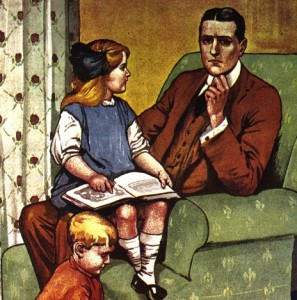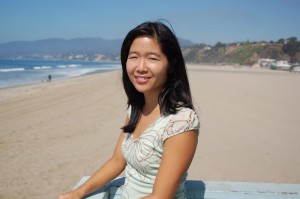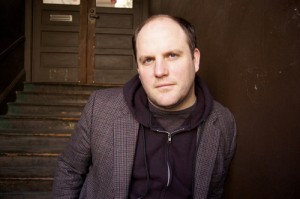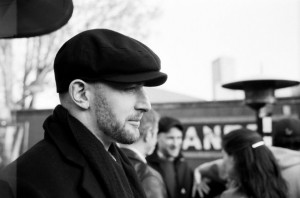 Bourbon and Milk features lessons, observations, and conversations by and with writers living out there in one of the most perplexing outposts of the human condition– parenthood. In this monthly series, Contributing Editor Giuseppe Taurino will dive into the dark spaces where parenting sometimes pushes us, and explore the unexpected ways writers may grow in them. If you’re interested in joining the conversation or contributing a Bourbon and Milk post, query Giuseppe Taurino at giuseppe@americanshortfiction.org.
Bourbon and Milk features lessons, observations, and conversations by and with writers living out there in one of the most perplexing outposts of the human condition– parenthood. In this monthly series, Contributing Editor Giuseppe Taurino will dive into the dark spaces where parenting sometimes pushes us, and explore the unexpected ways writers may grow in them. If you’re interested in joining the conversation or contributing a Bourbon and Milk post, query Giuseppe Taurino at giuseppe@americanshortfiction.org.
Recently, after nearly a full year of under-employment, an unexpected job opportunity popped up in Houston. We were living in Austin, so I’m not talking about a trek across the world, but we had a house, a kid in daycare, and my wife was poised to start a new job of her own. We had less than a week to decide. Confronted with a shit or get off the pot moment, we took a breath, built a list, and engaged in some sound adult planning. Ultimately, the year we’d gone through—uninsured, working too hard to scrape by, no margin for error—ended up making the Houston gig, and its perks, too good to pass up.
I’d move first, we decided. I’d set up shop, bring batches of our stuff, and begin to breathe life into our depleted capital, while P held things down in Austin. She’d pack, get the house ready to go on the market, and keep our daughter’s life as stable and consistent as possible. It wasn’t ideal, we agreed, but it was temporary. Before long, we’d sell the house, donate the crap we’d been hoarding in our garage, and be reunited, full-time, as a small, happy, economically stable little family.
What I failed to mention to P, and am only now volunteering, was that the whole thing had me giddy. It was a great opportunity, sure, a terrific chance to get back on track, but mostly I was pumped about the unexpected me-time I’d stumbled into. Between securing a realtor, prepping the house, listing on the market, going under contract and packing, I was looking, minimally, at a four-week respite from the grind of my everyday life. Needless to say, that’s not the kind of time parents typically have access to. Throw in the fact I’d gotten my MFA in Houston—it was where I was most productive as a writer, at least quantity-wise—and still had good friends and mentors in town, and I couldn’t help thinking of my pending alone time as a residency or fellowship.
My first week in Houston I ate bagels for breakfast, pizza for lunch, and Chinese food for dinner. I ran late at night. I stocked the fridge with bachelor basics, met friends for drinks, and thoughtfully worked my way through The Hours—the kind of subtle, layered novel I’d been unable to pick up since Z was born. I also, most importantly, dipped back into my own neglected manuscript, which I’ve been plucking away at for far too long. Besides work (which felt more like a hobby) the only time that wasn’t completely mine were the thirty-minute Skype chats that occurred between my daughter’s dinner and bath time.
On the other end, my girls were angry, moody, and overwhelmed. They alternately ignored and snapped at me. On more than one occasion, they each came to tears. “The worst of it is behind us,” I assured P from my bachelor pad. “You need to stay positive.” I loved and missed them, and I understood that selling the house and single parenting and not knowing where the hell daddy was were stressful, but these calls were annoying the crap out of me. I wanted to enjoy my break—after all, it was limited, I’d promised to be home for a day and a half each weekend, and I’d been writing far too sporadically the past year. If I was going to get the most out of my time alone in Houston, I needed to keep my head space clear to read, write and wander.
Then, my daughter got sick.
She was up all night coughing, my wife texted as I headed to work one morning. I’m exhausted. My nerves are shot.
Keep me posted, I replied.
Still coughing, P texted a little later, during a meeting. Should I take a cab to the doctor?
My wife had just gotten her license the week before I moved. She wasn’t comfortable driving the distance to our pediatrician’s office. I got this, but why did she need me to help make decisions from a distance? Why couldn’t she just hold things together on her end? Git-r done, I wanted to say.
Just take her the med clinic down the road, I texted. Or some such thing. Everything’s fine.
While of course, everything wasn’t. And before long the floodgates opened.
The medic says I should take her to ER immediately.
She can’t breathe. I’m freaking out.
She’s not responding to treatment.
They’re taking X-rays.
They can’t figure out what’s wrong.
Over the next five hours, each time my phone vibrated, my heart buried itself a little deeper into my chest. I couldn’t concentrate. I drifted in and out of conversations at work. I wondered if I’d ever been shittier in my life. My daughter’s condition, my inability to do anything, and my attitude in the days leading up to her hospital trip came together in a toxic emotional cocktail. I’d tapped a sensation I had no frame of reference for. I’d felt guilt before—my parents are old-school Italians who raised me Catholic—but I’d never carried such a crushing dose of it. In trying to segment my life in order to indulge an immediate desire, I’d done the worst thing a parent could do—I’d acted as if my family and I were mutually exclusive.
In the book I’ve been chicken-scratching my way through, the main character is a knucklehead who, in order to get where he wants to be, needs to eradicate and/or suppress various parts of himself—his upbringing, his history of ‘pulling up short’, his insecurities. On the surface, this logic isn’t terrible. There’s certainly no shortage of books (or movies or TV shows) that rely on the active suppression or attempted destruction of some aspect of a character’s identity—The Hours is particularly adept at navigating this space. The success of this narrative stance, however, relies heavily, if not entirely, on the inability to actually suppress or destroy. Sooner or later, things bubble to the surface, or, at the very least, right up against it. The tension that takes shape around this failure to fully suppress or destroy is where the crux of the story ultimately resides. Which, as I came to see through the lens of my own experience, is where I’ve been failing my main character and, thus, the uncooked book he’s knocking around inside of. While I’ve come to know who he is and what has gone into making him, I’ve largely written around those details in an attempt to keep things moving forward as he lunges towards his current wants. What I’m coming to terms with is in the process I’ve essentially rendered him two-dimensional. If the book is going to stand a chance, I’m going to have recognize and acknowledge exactly how, for lack of a better phrase, the parts impinge upon the whole.
That night, looking into P and Z’s exhausted faces, I fought competing urges to slobber the computer screen with kisses and get down on my knees to beg forgiveness. While the respiratory infection Z was finally diagnosed with was treatable, I couldn’t shake the feeling I’d somehow been reduced as a person. I felt like a caricature of myself. Fortunately, being alive and all, I can take steps to fix where I failed and fell flat, just in time to screw up again, feel guilty and try to fix that too. What I’m promising myself—and my family—here, however, is that I won’t again try to exist as some version of myself that isn’t informed by everything I’m comprised of. I’ve got some solid parental guilt to thank for that. And, I suppose, so do all those fully developed characters that lie in my future.
All this wading through parental inadequacy got me wondering about other writer-parents’ experience with guilt and how it has impacted their writing, either directly or through reflection. Here’s what I heard back from a few:
 I can’t say when I felt most guilty as a parent, for every moment as a first-time mother of twin boys is an opportunity to mess up. When Didi was less than a week old, I set him down on the couch, I turned away, the cushion shifted, and he rolled off, landing face down, spread eagle. Earlier this summer, Gege chipped his front tooth – but we didn’t notice until the sitter pointed it out days later. The injury might have happened at the children’s museum, when he slid off an eagle display onto the floor, or maybe after he was running down the driveway and went sprawling.
I can’t say when I felt most guilty as a parent, for every moment as a first-time mother of twin boys is an opportunity to mess up. When Didi was less than a week old, I set him down on the couch, I turned away, the cushion shifted, and he rolled off, landing face down, spread eagle. Earlier this summer, Gege chipped his front tooth – but we didn’t notice until the sitter pointed it out days later. The injury might have happened at the children’s museum, when he slid off an eagle display onto the floor, or maybe after he was running down the driveway and went sprawling.
Am I feeding them enough, offering a nutritious variety of home-cooked meals? Am I spending enough time talking and reading to improve their vocabulary? Should I speak in Chinese, the sitter in Spanish, and my husband in English? Am I present enough? This question, as a writer and a mother, I have struggled with the most – from the beginning.
Within the first month, I figured out how to type over their heads while they nursed. Sleep-deprived, I found it difficult to complete a thought, let alone a sentence, a paragraph, or a page. But as the boys became mobile, rolling, crawling, cruising, and then walking, so too I slowly returned to writing.
Growing up, when I asked where my mother had disappeared – to the lab, to the office? – my father replied, “Fei diao.” She flew away. Just as I fly away, too. Often I am distracted, thinking about my work while the twins race around the park or teeter on the edge of the play structure. A moment later, I feel guilty for failing to focus on the fleeting, torn between the children I gave birth to, and those sprung from my imagination.
After my father passed away last year, we moved in with my mother, and I’ve gained a deeper understanding of how she balanced her science career and family. She doesn’t seem to have lasting regrets about pursuing her research, maybe because she sees her three children have excelled and endured, curious and free-spirited and determined like her. Maybe, like me, she came to realize without devotion to her calling, she would never be whole – not the kind of mother she wanted to be.
Vanessa Hua is an award-winning writer and journalist who blogs at threeunderone.blogspot.com
 Recently, I stopped feeling guilty about being a flawed parent, or the kind of parent others would perceive as flawed. I was sitting in the living room with my 3-year-old and my 10-month-old daughters, who were both playing quietly on the floor, not scribbling on the walls or playing in the toilet water. It struck me: These kids are great, and I love them, but I’d rather be doing something else.
Recently, I stopped feeling guilty about being a flawed parent, or the kind of parent others would perceive as flawed. I was sitting in the living room with my 3-year-old and my 10-month-old daughters, who were both playing quietly on the floor, not scribbling on the walls or playing in the toilet water. It struck me: These kids are great, and I love them, but I’d rather be doing something else.
I had a sense that this was “wrong,” or that I should feel guilty. We’re supposed to — at least in the current prevailing parenting culture in middle-class America — adore hanging out with our kids, we’re supposed to eagerly disregard our own interests and desires in favor of the interests and desires of our kids. The fact is, I just don’t like playing with them that much, and I actually don’t think I should be responsible for entertaining them. I’ll talk to them, I’ll make jokes with them, I’ll feed them and change their diapers, but I’m not going sit on the floor with them for hours and fork over every part of myself for their benefit. And I’m not all that sure it’d be to their benefit if I did: self entertainment is an useful skill, it was this need to entertain myself that got me reading and writing fiction when I was eleven years old, which has now, at last, become a pseudo-gainful career for me.
In my second novel The Dismal Science the 60-something protagonist’s only living family is his 20-something daughter. She becomes a repository for love that would go elsewhere if he had other relationships. Meanwhile, she does have other relationships, and so she essentially tells him: I love you, but I’ve got other things to do, like hang out with my boyfriend. And so can you scram for a while, or something?
To his own surprise, he’s gravely wounded by her mild indifference. Over lunch at a department store, when she tells him that she’s not going to spend Christmas with him, he responds in a way that’s deliberately cold and hurtful to her:
Leonora’s pain was clear in her face. It was as if she could tell he had never felt so little love for her. From that dreaded theory of the stages of mourning—the Kübler–Ross gauntlet—he had harvested one idea that stood up to scrutiny: some emotions must occur, almost by definition, separately. So, although he loved Leonora—loved her far more than any other living being—he could still hate her at times, too; and when he hated her, he just hated her.
She wanted to stay and say more, this much was clear. She wanted to talk it out and dispel the horrible feeling right away, but he was already standing up, already going for his coat, saying, “You ready?” and, “Don’t forget the bag.”
Maybe this painful exchange could’ve been avoided if he weren’t so dependent on her. There’s more to it than that, of course, but insofar as my actual life and my fiction are sometimes in a quiet conversation to which my conscious mind is not invited, it does present a question for me about how much of myself to reserve from my kids.
I love my children, and I would do a lot for them, but my life did not begin when they were born, and it will not end when they head off to college. In the meantime, I will not be subsumed, and I will not feel terrible about myself for claiming my own space.
Peter Mountford is the author of A Young Man’s Guide to Late Capitalism and the forthcoming The Dismal Science.
 Late one Sunday morning last January, I took my almost three year old daughter to an indoor playground located in a mall in Bellevue, Washington, and after we had played together for half an hour I took a seat on the periphery and, looking up every so often to lay eyes on my little girl, I read Tom Franklin’s Crooked Letter, Crooked Letter. I’ll never forget the moment I glanced over and noticed my daughter had climbed to the top of the monkey bars. In that same instant, she fell, her chin hit one of the bars, her teeth cut into her tongue, and by the time she hit the mat her mouth had filled with blood. I scooped her into my arms and yelled at the other adults in the indoor playground, “Is anyone a doctor?” Not a single one of them answered. They shrugged and looked at their cell phones. A woman who worked as a nurse suggested I put pressure on my daughter’s tongue. I grabbed paper towels and pushed steadily on it, and after a few minutes the bleeding stopped. By the time paramedics arrived, Grace’s crying had become a sniffle. She clung to me as one of them shined a flashlight into her mouth. Luckily, the tongue is the fastest healing muscle in the human body. Although Grace didn’t eat anything for the rest of the day, she ate apple sauce and yogurt the following morning, and the next day she began eating solid foods again. My wife told me I should not feel that it was my fault. That our daughter would move fast and get hurt sometimes, and that I couldn’t always save her. I had just written a short story set in contemporary Lebanon, where I had taken my family the previous summer. At the end of the story, which focuses on a diplomat’s wife cracking under the pressure of looming civil war, the main character kills someone. She does it out of fear rather than malice. As I wrote that scene, I wanted her to do something else, but I knew that I could not control her, and if I tried I would lose her. And I could say the same about my daughter. Ever since the incident at the indoor playground, I’ve been watching Grace more carefully, and I’ve been letting my characters do what they must. Absolute control is a fallacy I restrain myself from trusting as a parent and as a writer.
Late one Sunday morning last January, I took my almost three year old daughter to an indoor playground located in a mall in Bellevue, Washington, and after we had played together for half an hour I took a seat on the periphery and, looking up every so often to lay eyes on my little girl, I read Tom Franklin’s Crooked Letter, Crooked Letter. I’ll never forget the moment I glanced over and noticed my daughter had climbed to the top of the monkey bars. In that same instant, she fell, her chin hit one of the bars, her teeth cut into her tongue, and by the time she hit the mat her mouth had filled with blood. I scooped her into my arms and yelled at the other adults in the indoor playground, “Is anyone a doctor?” Not a single one of them answered. They shrugged and looked at their cell phones. A woman who worked as a nurse suggested I put pressure on my daughter’s tongue. I grabbed paper towels and pushed steadily on it, and after a few minutes the bleeding stopped. By the time paramedics arrived, Grace’s crying had become a sniffle. She clung to me as one of them shined a flashlight into her mouth. Luckily, the tongue is the fastest healing muscle in the human body. Although Grace didn’t eat anything for the rest of the day, she ate apple sauce and yogurt the following morning, and the next day she began eating solid foods again. My wife told me I should not feel that it was my fault. That our daughter would move fast and get hurt sometimes, and that I couldn’t always save her. I had just written a short story set in contemporary Lebanon, where I had taken my family the previous summer. At the end of the story, which focuses on a diplomat’s wife cracking under the pressure of looming civil war, the main character kills someone. She does it out of fear rather than malice. As I wrote that scene, I wanted her to do something else, but I knew that I could not control her, and if I tried I would lose her. And I could say the same about my daughter. Ever since the incident at the indoor playground, I’ve been watching Grace more carefully, and I’ve been letting my characters do what they must. Absolute control is a fallacy I restrain myself from trusting as a parent and as a writer.
Zachary Watterson’s short stories and essays have appeared in the Massachusetts Review, River Styx, The Stranger, Commentary‘s 2012 Summer Fiction Issue, and Post Road.